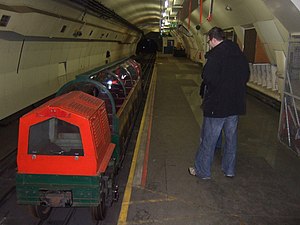London Post Office Railway
| London Post Office Railway | |
|---|---|

A station on the railway with sight-seeing train
|
|
| Overview | |
| Type | Private industrial railway |
| Status | Mothballed |
| Locale | London, United Kingdom |
| Termini | Paddington Sorting Office Whitechapel Eastern Delivery Office |
| Stations | 8 |
| Services | 1 |
| Operation | |
| Opened | 3 December 1927 |
| Closed | 31 May 2003 |
| Owner | Royal Mail |
| Depot(s) | Mount Pleasant |
| Rolling stock | 1980 Greenbat |
| Technical | |
| Line length | 6.5 miles (10.5 km) |
| Number of tracks | Two-four-six |
| Track gauge | 2 ft (610 mm) |
| Loading gauge | Custom gauge |
| Electrification | 440 V DC CR |
| Operating speed | 40 mph (64 km/h) through core tunnels; 7 mph (11 km/h) through stations, platforms and loops |
| Highest elevation | 70 feet (21 m) below street level |
The Post Office Railway, also known as Mail Rail, is a 2 ft (610 mm) narrow gauge, driverless underground railway in London that was built by the Post Office with assistance from the Underground Electric Railways Company of London, to move mail between sorting offices. Inspired by the Chicago Tunnel Company, it operated from 1927 until 2003. Part of the railway will be opened to visitors in mid-2017.
The line ran from Paddington Head District Sorting Office in the west to the Eastern Head District Sorting Office at Whitechapel in the east, a distance of 6.5 miles (10.5 km). It had eight stations, the largest of which was underneath Mount Pleasant, but by 2003 only three stations remained in use because the sorting offices above the other stations had been relocated.
In 1911 a plan evolved to build an underground railway 6 1⁄2 miles (10.5 km) long from Paddington to Whitechapel serving the main sorting offices along the route; road traffic congestion was causing unacceptable delays. The contract to build the tunnels was won by John Mowlem and Co. Construction of the tunnels started in February 1915 from a series of shafts. Most of the line was constructed using the Greathead shield system, with limited amounts of hand-mining for connecting tunnels at stations.
The main line has a single 9-foot (2.7 m) diameter tube with two tracks. Just before stations, tunnels diverge into two single-track 7-foot (2.1 m) diameter tunnels leading to two parallel 25-foot (7.6 m) diameter station tunnels. The main tube is at a depth of around 70 feet (21 m). Stations are at a much shallower depth, with a 1-in-20 gradient into the stations. The gradients assist in slowing the trains when approaching stations, and accelerating them away. There is also less distance to lift mail from the stations to the surface. At Oxford Circus the tunnel runs close to the Bakerloo line tunnel of the London Underground.
...
Wikipedia
